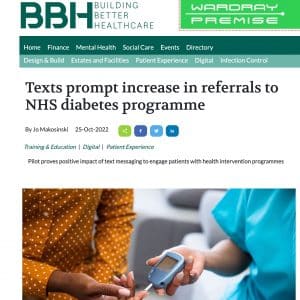Meddbase’s pilot study with NHS Humber and North Yorkshire ICB on using technology to improve Diabetes prevention referrals has been featured in Digital Health. Read the full article on Digitalhealth.net
Text message prompts boost engagement in healthy lifestyle programmes
A pilot study from NHS Humber and North Yorkshire Integrated Care Board (ICB) has revealed how powerful text messaging can be in increasing patient engagement in healthy lifestyles programmes.
The pilot found that text message prompts to patients increased the number of referrals to the NHS Diabetes Prevention Programme (NDPP) by over 1,000%.
The study set out to explore whether the digital communications software managed at ICB-level is more effective than postal invites to engage patients in health programmes. It was supported by the ICB’s clinical technology partner, Meddbase.
According to the study, using patient identification tools and automated text message prompts led to a:
- 1,000% + increase in NDPP referrals
- 331% increase in the number of patients who attend at least one session of the NDPP
- 181% increase in the number of patients attending sessions over a three-month period.
Meddbase software was used to enable the ICB’s engagement officer to quickly identify eligible patients, check them against criteria and also schedule text message prompts for the patient. At the same time all this information is captured into the electronic patient record.
Dr Tom Milligan, clinical lead for diabetes in Humber and North Yorkshire, said: “The software used for this pilot enabled the ICB to conduct advanced searches for the first time, so they could identify, invite and refer patients that would otherwise have been missed.
“The result was far greater uptake of the NDPP as well as significant time saved for clinical staff. Given the current capacity challenges within general practice and the cost to the NHS of lifestyle-related conditions like type 2 diabetes to the NHS, the findings here could have a huge impact.”





